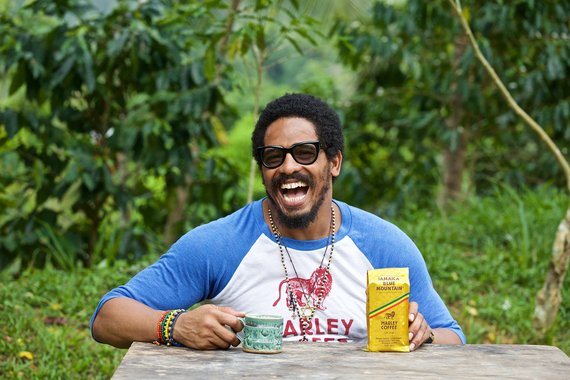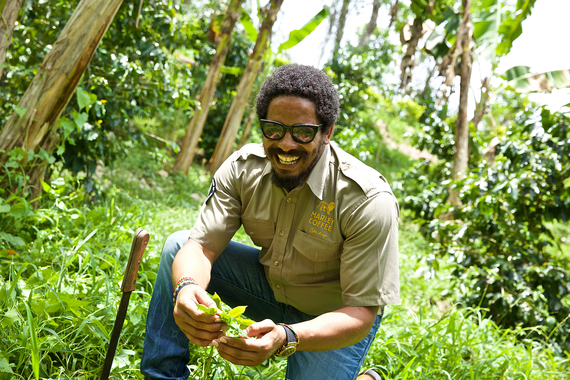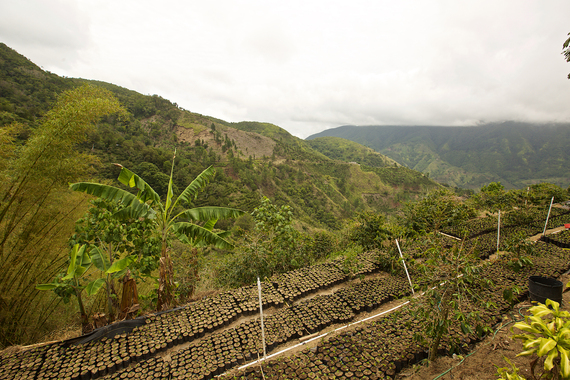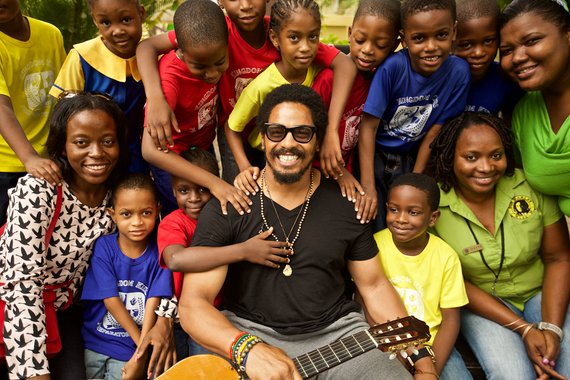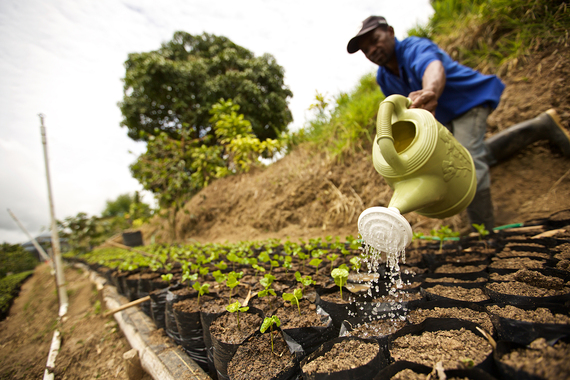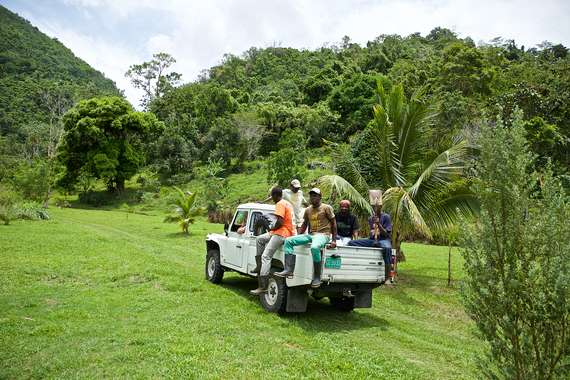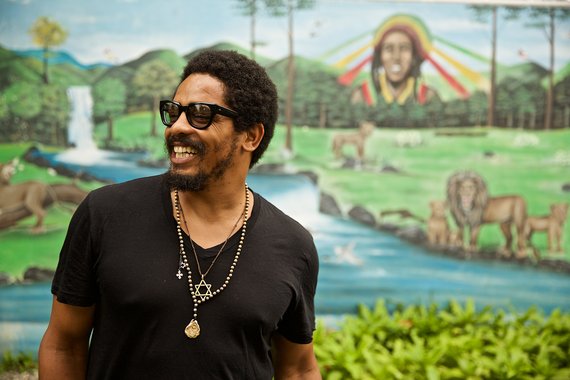Rastafari is a belief that God is man and man is God. It is a belief that humans are called on to celebrate and protect life and that the spoken word, as a manifestation of the divine presence and power, can both create and bring destruction. Those who follow Rastafari believe that they are chosen to manifest God's power and to promote peace and love in the world.
Rohan Marley is a 44 year old athlete, entrepreneur, and son of reggae artist, peace maker, and world changer, the late Bob Marley. Rohan Marley grew up in Miami, living with his dad and then his grandmother. His dad passed away from cancer when he was just nine years old. He attended the University of Miami where he was a star football player, playing alongside players like Dwayne Johnson and Ray Lewis. After college, he went on to play professional football in the Canadian Football League prior to setting off on a personal journey to find his passion, his purpose, and his legacy.
While many of Bob Marley's children went on to become musicians in their own rights, Rohan went in a different direction. He says he wasn't born musically gifted like most of his family members. That being said, he's very much Bob Marley's son. What he did carry forward from his dad's legacy is an intense following of Rastafari, an immense respect for and ensuing belief in Ethiopian Orthodox Christianity, and a contagious love and passion for the land and community of Jamaica from which he has not only built a massive coffee empire, but has also created a sustainable community that continues to provide sustenance to the farmers and local citizens, all supported by the richness of the earth.
I recently spent an afternoon sipping Marley Coffee, and chatting about Rastafari, entrepreneurship, lions, and growing up Marley with a man who is the embodiment of the peace, love, unity, and respect movement his father put on the map through his music beginning in the 1960s. Just like his dad, he is a committed Rastafari who continues to infuse his Jamaican culture and identity into everything he does. Rohan Marley has fathered seven children, traveled countless times to Ethiopia seeking answers on life and religion, has built several business empires, and has encountered massive loss and disappointment along the way, beginning with the loss of his greatest mentor, his dad, at a very young age. What does it take to cling to peace, love, unity, and respect through the most difficult of times? How does Rastafari fit into business? Here are Rohan Marley's 5 simple strategies for blending entrepreneurship with Rastafari, creating empires infused with peace, love, unity and respect. Here's everything you need to know to become a Rastapreneur:
Access Not Ownership: After a short stint in professional football and after a few years working on the road for his brother's band, Marley was approached in 1999 by reggae artist, IQulah Rastafari, who knew of 52 acres of land being sold in The Blue Mountains in Jamaica. Rohan visited the land for a tour. He says the land was the most fertile he had ever seen in the world, full of fruit bearing trees and even a hidden river with a waterfall fed from The Spanish River. At the end of the property tour, Rohan was met by a large group of local citizens waiting to talk to him. The locals explained that they were dependent on the land to provide work for them and they wanted to know Rohan's intentions. It was these local farmers who explained that the land was perfect for producing coffee. Rohan says it was because of this passionate community of local citizens that he agreed to buy the land and to begin a coffee farm. Right from the start, Rohan held a unique perspective on property ownership. Although technically he owns 52 acres, he says that really nobody owns anything at all. He says that the only thing we really have is access, since it's not a physical item that can be wrapped, carried, or transported. He says that he and his farmers now had access to fertile land in order to create ongoing resources for the community. In that vein, Marley immediately went to work learning everything there was to know about coffee farming. Although he had big plans for his coffee farm from the beginning, it took ten years for him to find, partner with, and hire the appropriate people and to locate resources to scale the business. During that ten years, Marley kept the farm operational only to provide work for the local citizens. He says there wasn't anything left over for him during those years, but it was his Rasta belief system which taught him that the needs of the community outweighed his own needs, and so the farm remained operational for the farmers for an entire decade.
One Love, One Heart: One of the immediate changes Marley made when he took over the coffee farm in 1999 was that he got rid of all the chemicals and poisons used by the previous owner to grow coffee. Marley says that as a Rastaman he has an intense understanding of the unity of everything on earth. He believes that by applying chemicals and poisons to the earth, those poisons also effect everything else, including the people. Marley, like his dad, believes that the earth and all people are one. Marley applied to become a certified organic farm in the early days of his farm ownership, and he became accredited more than 7 years later, one of the first coffee farms in Jamaica to receive such accreditation. Marley says that in life and in business, it is essential to take as much care of the people, places, and things around you, as you would of yourself, regardless of profit, and, just like the most fertile coffee lands in the world, they will produce for you naturally.
Follow Your Purpose: From 1999 to 2009 Rohan Marley kept on returning to his coffee farm off and on. He knew he had something special, but he couldn't figure out how to make it work. He learned the fine art of planting, harvesting and processing the cherries, drying and milling the beans, and eventually exporting them. At each leg of his journey, Rohan met with adversity. At one point he asked one of the local manufacturers to help mill the beans for exportation, and they took the beans never to return them or pay for them. No sooner did he learn that he could make 10 times more by exporting the coffee beans for roasting and grinding, did he also learn that he was harvesting way below the minimum needed to export, thereby squashing his hopes of exportation. Every time Marley met adversity, he would leave the farm in the hands of his farmers so that they could continue to plant and cultivate to provide for their own families, while he figured out other ways to provide for his own. On multiple occasions during this period, Rohan Marley found himself visiting monasteries of Ethiopia seeking answers about his purpose and his Ethiopian Orthodox Christian beliefs. In his first visit to Ethiopia in 2000, Rohan took a seven hour canoe trip down Lake Tana to visit a monastery with Bathawi Gebre Meskel. While there Bathawi put a coffee cherry in Rohan's pocket and told him it would be his future. Rohan was baffled by this at the time because most of the Ethiopian Orthodox Christian religion and most Rastas don't drink coffee. Seven years later, on a return trip to the same monastery in Ethiopia, Rohan arrived on land after the seven hour canoe trip and found coffee cherries drying on large slabs of slate. Perplexed, Rohan asked a monk why they were drying coffee when the religion doesn't believe in coffee. The monk explained that although many of their religion didn't indulge in coffee, there is great value in trading one of their greatest resources, coffee beans, for the resources their people were in dire need of, like food, clothing, and shelter. The monk explained that, for them, coffee was universal because by trading it, it provided everything they needed to give sustenance to their people. Rohan says that every person should take the time to seek answers to life and to question their purpose, because answers will show up out of nowhere. It was during his 2007 trip to the monastery that Rohan knew for certain he was going to once again figure out a way to build his coffee empire.
Find Your Inner Lion: Rohan says that there was a point in 2006 in which he felt like a massive failure. All of Bob Marley's other kids had gone on to do great things in business, life, and music, and Rohan says that he had failed in just about every endeavor he went after. He had failed in coffee, in his professional football career, in business, and in relationships. Rohan says that everyone faces times in their life where they are confronted with fear, sadness, loneliness, and failure. He says it is times like these in which we must find our inner lion. The symbol of Marley Coffee, the symbol of Rastafari, and the original symbol which flew on the Ethiopian flag is the lion. Rohan says that the lion represents strength and courage in the face of adversity. It was 2007, eight years after purchasing his farm, Marley says he found his inner lion. He became absolutely determined to launch one of the biggest and best, sustainable, organic, globally responsible, coffee empires in the world. In 2007 he created the Marley Coffee brand and designed his coffee line. In 2008, Rohan partnered with Richard and Jason Sharp whose family has been in the coffee business for 60 years and who also had coffee farms Jamaica. They too believed in Rastafari and they had access to thousands of acres of coffee farms so that minimum exporting guidelines could be met. In 2009 Marley went about building an American based sales force, distribution arm, and leadership team. In 2010, Marley Coffee produced and shipped $37K in coffee.In 2011, they produced and shipped $1.5M in coffee, and today they are in 12,500+ stores in North America, doing over $13M a year in business. They are a prominent sustainable coffee brand in the EU and in Canada. They are the fastest growing coffee brand in Chile and they have launched in South Korea with 14 coffee shops. In Jamaica, they are providing jobs for 300 community farmers. Rohan says that when you keep on falling down, rejoice in the fact that somewhere living within you there is a lion, just waiting to make a move.
Be Love: Rohan recalled a time when he was five years old when he was playing with his brothers and sisters at his father's home in Jamaica. They were playing inside of 56 Hope Road in the yard eating ice cream. Some local kids were on the other side of the fence and Rohan, along with his brother Stephen, told them they could not enter. Bob Marley called his kids into the house and offered them a lesson on humility. He explained to Rohan and his other children that the kids outside the fence might not have the food, toys, and ice cream like they did, and that being a good person meant caring more about the kids outside the fence than they did about themselves. Bob Marley had his kids bring ice cream to the kids outside the fence and encouraged them to go play together for the afternoon. Rohan says that although their time together on earth was short, his dad taught him how to be love. Rohan says that being a Marley to him means being Rastafari, being humble, and showing love by giving back to friends, family, community, and to humanity. Being love, says Rohan, is about creating a better world for all of humanity, because we are all one.
He is wise, humble, spiritual, and determined. He continues to spread the message his father sang about since the 1960s. He is the embodiment of peace, love, unity and respect, and he infuses these qualities into everything he touches, including business. He's more than just a kind person, he's Rastafari. He's more than just a businessman, Rohan Marley is the original Rastapreneur.
Photo Credits Lou Bopp

